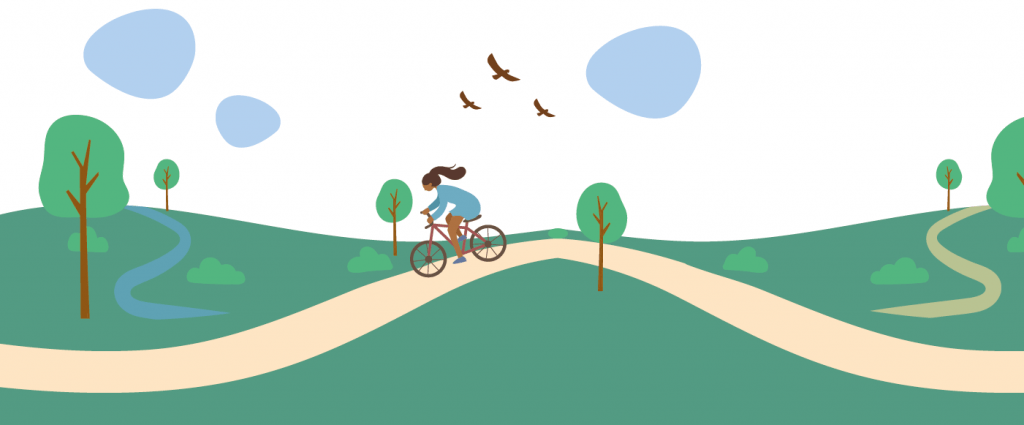A question that’s often asked is, “can stress cause frequent urination?”. Unfortunately, it’s not as straightforward as a simple yes or no. We’re deep-diving into this tricky topic to clarify the link between mental and bladder health and give you tips on improving both!
The link between mental and bladder health
Regrettably, the link between bladder issues and mental health problems doesn’t just go one way. That’s to say that stress can cause (or, at the very least, worsen) frequent urination1, but the opposite is also true2.

How stress impacts frequent urination
Many of us are familiar with the sensation of needing to pee when we feel anxious or stressed. Well, there’s a scientific reason behind this.
Worrying triggers the stress response, which causes the body to release stress hormones.3 This is a survival instinct that enabled our ancestors to protect themselves quickly4. While this defensive mechanism was useful when faced with a sabre-toothed tiger, its effects are less helpful in modern life.
Also known as the fight or flight response, this secretion of hormones causes various physiological effects. In terms of frequent urination, it:
- immediately empties the bladder and bowels so that you don’t need to pee in the middle of dealing with an emergency
- relaxes the bladder and tightens sphincter muscles (which keep tubes in the urinary tract closed) so you don’t have to stop for a wee while fighting or fleeing
- increases heart rate. You might be surprised to learn that this causes the kidneys to filter urea more quickly and create more pee
- increases metabolism, which creates more urine
- actives the autonomic nervous system, which can cause an urge to wee, as well as cause the sphincter muscles to release involuntarily in some people.5

In addition, mental health issues can lead to lifestyle choices that negatively impact bladder health. For example, some people use smoking to “self-medicate” to alleviate stress6, but the chemicals in cigarette smoke can irritate the bladder, and a “smoker’s cough” can cause leaks7. Others may turn to a glass of wine as a coping mechanism.8 However, as alcohol is a diuretic (something that increases urine production), it can worsen symptoms of an overactive bladder.9 Finally, people experiencing depression are 55% more likely to become overweight than their peers10, which seems to be linked to OAB11. Being obese may put pressure on your bladder, which may damage your pelvic floor muscles.12
How frequent urination causes stress
Having an overactive bladder (OAB) can, of course, cause stress and anxiety. While 16-17% of adults over 18 years old experience OAB symptoms13, many still find it taboo. Research suggests that around 50% of people who experience frequent urination also experience anxiety symptoms, with about 25% classing their anxiety as moderate to severe.14

Tips for de-stressing and improving bladder symptoms
Although we’ve established that happiness and good mental health play a role in reducing frequent urination, de-stressing is easier said than done.
A great starting point for reducing anxiety around an overactive bladder is to use the correct continence products to protect against leaks. Infused with chamomile, the iD Light range is soothing, discreet and comfortable – perfect for light incontinence. If you experience more severe leaks, adult pants are a great option. iD Pants feature odour control technology and come in a range of absorbencies. Once you’ve got the right product to suit your needs, you’ll feel more confident and less stressed!

Additionally, you can improve your mental health through:
- regular light to moderate exercise, which has the dual benefit of decreasing stress but also strengthening your muscles
- getting 7-9 hours of sleep per night, as this helps lower the stress hormone during the day
- avoiding stimulants and diuretics (such as coffee), as these a) worsen stress and b) increase the urge to pee14
- relaxation exercises, such as “Progressive Muscle Relaxation”, which involves slowly tensing and relaxing your muscles to make you feel less stressed15. This is particularly effective during an anxiety attack or just before bed to help you sleep well
- meditation16
- keeping a bladder diary to identify triggers of stress and incontinence
- seek professional help for your bladder problem or mental health issue if you feel you cannot cope17.
Educating yourself about your condition can also be an effective way of lessening your stress and anxiety. Check out our other articles on incontinence and its causes to learn more!
Sources
1 “Anxiety Urination: An Inconvenient Symptom”, CalmClinic, n.d., Source: https://www.calmclinic.com/anxiety/signs/urination-problems
2 “6 tips for easing stress and anxiety from overactive bladder”, Morgan Meissner, 7 June 2021, Source: https://www.medicalnewstoday.com/articles/tips-for-easing-stress-and-anxiety-from-overactive-bladder
3 “What Happens to Your Body During the Fight or Flight Response?”, Cleveland Clinic, 9 December 2019, Source: https://health.clevelandclinic.org/what-happens-to-your-body-during-the-fight-or-flight-response/
4 “Fight, Flight, Freeze: What This Response Means”, Kirsten Nunez, 21 February 2020, Source: https://www.healthline.com/health/mental-health/fight-flight-freeze
5 “Frequent Urination Anxiety Symptoms”, Jim Folk, 19 May 2021, Source: https://www.anxietycentre.com/anxiety-disorders/symptoms/frequent-urination/
6 “Smoking and mental health”, Mental Health Foundation, 9 March 2021, Source: https://www.mentalhealth.org.uk/a-to-z/s/smoking-and-mental-health
7 “7 Urologic Conditions Impacted by Smoking”, Urology Care Foundation, 14 March 2018, Source: https://www.urologyhealth.org/healthy-living/care-blog/2018/7-urologic-conditions-impacted-by-smoking
8 “Alcohol and mental health”, Mental Health Foundation, 16 February 2022, Source: https://www.mentalhealth.org.uk/a-to-z/a/alcohol-and-mental-health
9 “Overactive Bladder Diet: Food, Wine & Other Considerations for Smart Eating & Drinking”, University of Colorado Urogynecology, 17 December 2016, Source: https://urogyn.coloradowomenshealth.com/blog/overactive-bladder-diet.html
10 “The relationship between mental health and obesity”, Priory, n.d., Source: https://www.priorygroup.com/blog/the-relationship-between-mental-health-and-obesity
11 “Relationship between Body Mass Index and Overactive Bladder in Women and Correlations with Urodynamic Evaluation”, Tariq F. Al-Shaiji & Sidney B. Radomski, 30 September 2012, Source: https://www.ncbi.nlm.nih.gov/pmc/articles/PMC3469831/
12 Ibid.
13 “Tips for Easing Stress and Anxiety from Overactive Bladder”, Colleen M. Story, 27 November 2017, Source: https://www.healthline.com/health/overactive-bladder-and-anxiety
14 “6 tips for easing stress and anxiety from overactive bladder”, Morgan Meissner, 7 June 2021, Source: https://www.medicalnewstoday.com/articles/tips-for-easing-stress-and-anxiety-from-overactive-bladder
15 “Frequent Urination Anxiety Symptoms”, Jim Folk, 19 May 2021, Source: https://www.anxietycentre.com/anxiety-disorders/symptoms/frequent-urination/
16 “Anxiety Urination: An Inconvenient Symptom”, CalmClinic, n.d., Source: https://www.calmclinic.com/anxiety/signs/urination-problems
17 “Urges to pee and other ways our bodies react to anxiety”, Arti Patel, 9 May 2019, Source: https://globalnews.ca/news/5253781/peeing-when-anxious/18 “How stress and anxiety affect your bladder”, Marelize Wilke, 22 June 2019, Source: https://www.news24.com/health24/medical/incontinence/incontinence-in-women/how-stress-and-anxiety-affect-your-bladder-20190618
